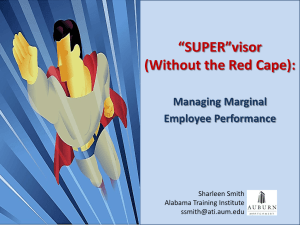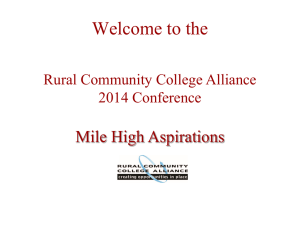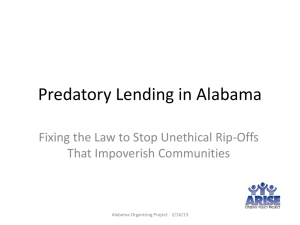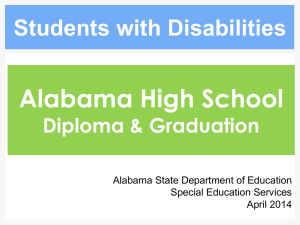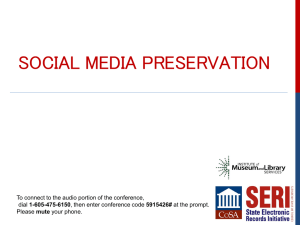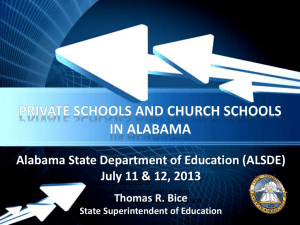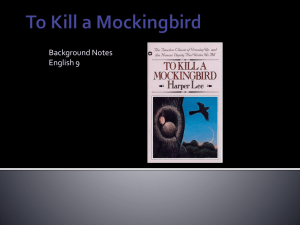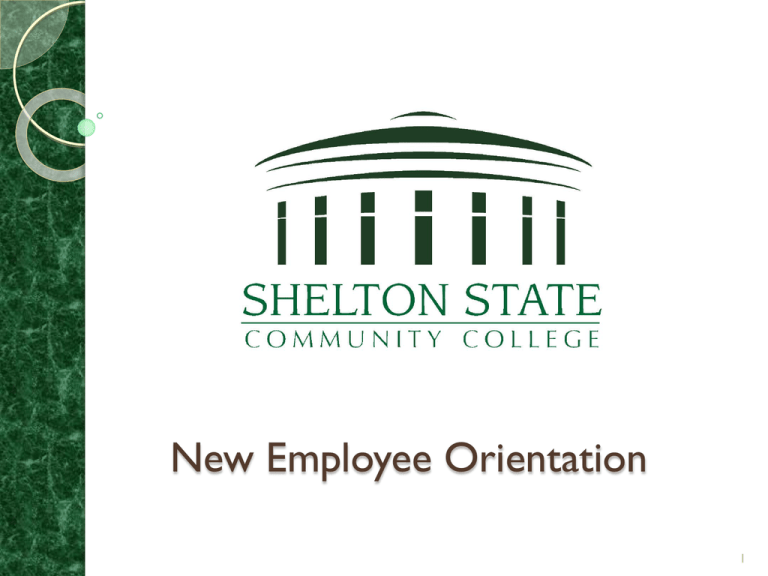
New Employee Orientation
1
Welcome to SSCC!
As President of Shelton
State Community College,
I want to welcome you to the
SSCC family.
Mark. A. Heinrich, Ph.D.,
President
2
The Alabama Community College System
(ACCS)
Shelton State Community College is part of the
Alabama Community College System which consists of
22 comprehensive community colleges, four technical
colleges, Athens State University; and extensive
workforce development initiatives including the Alabama
Industrial Development Training Institute and the
Alabama Technology Network.
The System’s mission, established by the State Board of
Education, is to provide accessible, quality educational
opportunities, to promote economic growth, and to
enhance the quality of life for the people of Alabama.
3
SSCC Mission Statement
Shelton State Community College is a public, open-admission,
comprehensive, community college whose primary mission is to
provide accessible postsecondary education, training, and
community educational opportunities.
Shelton State Community College is accredited by the
Commission of Colleges of the Southern Association of College and Schools.
4
SSCC Institutional Values
Excellence
Accountability
Quality
Integrity
Transparency
Affordability
5
SSCC Campuses
Martin Campus
9500 Old Greensboro Road
C.A. Fredd Campus
3401 Martin Luther King Jr. Blvd.
6
History of Shelton State
MARTIN CAMPUS
Shelton State Community College is part of a state system of public colleges. This system originated in
the Alabama Trade School and Junior College Authority Act enacted by the state legislature in May 1963.
The governing board for the institutions within this system is the Alabama State Board of Education
(ASBE) and the Chancellor, Alabama College System, Department of Postsecondary Education, is the
chief executive officer of the system.
Shelton State Community College was established by resolution of the ASBE on January 1, 1979. That
resolution combined two existing institutions: Shelton State Technical College, established in 1952, and
the Tuscaloosa branch campus of Brewer State Junior College, an institution whose main campus was
located in Fayette, Alabama. The Tuscaloosa branch campus of Brewer State had been in operation since
1972.
C. A. FREDD CAMPUS
In 1994, Shelton State Community College consolidated with C. A. Fredd State Technical College,
another public two year college located in Tuscaloosa. The new institution created by the consolidation
retained the name of Shelton State Community College, and the president of Shelton State was named
president of the consolidated institution. The institution now called Shelton State Community College,
C. A. Fredd Campus, was created by the state legislature in 1963 as Tuscaloosa State Trade School. In
1974, the institution became Tuscaloosa State Technical College and was authorized by the ASBE to
grant the associate degree. In 1976, the college name was changed to C. A. Fredd State Technical
College to honor the first president of the institution. C. A. Fredd State Technical College was
recognized as one of the nation’s Historically Black Colleges and Universities. The C. A. Fredd Campus
of Shelton State Community College maintains that identity and continues the specific HBCU mission
of promoting educational access and opportunity for all students in a culturally diverse community.
7
History of Shelton State
THE ALABAMA STATE FIRE COLLEGE
The Alabama Fire College and Personnel Standards Commission/Shelton State Community College is
responsible for training the thousands of paid and volunteer fire fighters, industrial fire protection
personnel, rescue squad members, and emergency medical personnel throughout the state of Alabama
as mandated in The Code of Alabama, 1975, 36 32 1 through 36 32 12, which also requires certification
for paid fire fighters as a condition of employment.
The Alabama State Fire College was created by Act Number 373, Regular Session, 1955 of the Alabama
Legislature. However, a program of fire department/public safety training and education had been in
existence since 1935 under the administration of the Trade and Industrial Education Department,
Division of Vocational Education, State Department of Education.
In 1975, the Alabama Legislature passed the Alabama Fire Fighters Personnel Standards and Education
Act. This much needed legislation served as the catalyst requiring formal fire fighting education and
certification within the first twelve months of being employed by a paid fire department. In April 1981,
The Alabama State Board of Education placed the Alabama State Fire College with Shelton State
Community College for administrative and fiscal agent purposes. In May 1988, through Act 88 663, the
Alabama Legislature merged the Alabama Fire Fighters Personnel Standards and Education Commission
and the Alabama Fire College.
ALABAMA COMMUNITY COLLEGE OF THE FINE ARTS
In 1997, in recognition of its contributions to and potential in the music, dance, and theatre, the
Alabama Legislature, by joint resolution, designated Shelton State Community College as the Alabama
Junior College of the Fine Arts.
8
Shelton 2020: Realizing Our Vision
1.0 Enriching Student Learning and Development
◦
◦
◦
◦
2.0 Empowering Faculty and Staff
◦
◦
◦
◦
SSCC will build a team of diverse, student-centered faculty and staff with the best qualifications and experience in all
positions.
SSCC will maximize opportunities for faculty and staff development.
SSCC will be inclusive and open in all deliberations and communications regarding its policies, procedures, and
performance expectations.
SSCC will encourage faculty and staff to pursue innovative strategies that enhance student learning and services.
3.0 Expanding Our Impact Areas
◦
◦
◦
◦
◦
SSCC will develop and sustain excellence in instructional programs and support.
SSCC will expand eLearning and other innovative delivery methods for instruction.
SSCC will achieve and maintain student retention, transfer, and graduation rates comparable to national benchmarks.
SSCC will enhance the student life experience through excellence in programs, services, and facilities.
SSCC will assess and respond to community needs and opportunities and seek to expand partnerships consistent
with its mission.
SSCC will enhance its accessibility and services to underrepresented populations.
SSCC will enhance its distinction as Alabama’s Community College of the Fine Arts.
SSCC will be an essential component for postsecondary education and career/workforce preparation for the region.
SSCC will strengthen partnerships with educational entities within Alabama.
4.0 Ensuring Our Future
◦
◦
◦
◦
◦
◦
SSCC will pursue strategies to increase enrollment to 12,000 by 2020.
SSCC will develop and implement an integrated marketing plan to increase public awareness.
SSCC will increase alternative sources of revenue for the operating budget through alternative sources.
SSCC will pursue a global focus in education and service.
SSCC will adopt national best practices to provide a campus environment that is safe, sustainable, and secure.
SSCC will develop a comprehensive long-range plan to utilize technology.
9
SSCC Quick Facts
Degrees Offered:
◦
◦
◦
◦
Associate in Arts (AA)
Associate in Applied Science (AAS)
Associate in Science (AS) Certificate
Short Certificate (<26 hours)
Tuition:
◦
$109 per credit hour for residents & in-state
◦ $199 per credit hour for non-resident or out-of-state
Full-Time Faculty
◦ Tenured: 74
◦ Tenure Track: 8
Full-Time Support Staff: 156
Total Adjunct Instructors: 160
Total Number of SSCC Graduates (since 1979): 9,118**
*Source: The Shelton State Community College Fact Book 2009-2010.
**Records prior to 1979 were not computerized
10
SSCC Student Profile
Full-time Students
◦ Spring 2010: 3930
Gender of Students
◦ Female: 53%
◦ Male:
47%
Ethnicity of Students
◦
◦
◦
◦
◦
African American:
American Indian:
Asian:
Caucasian:
Hispanic:
30.8%
0.3%
0.7%
63.5%
0.9%
Average Student Age: 24 years
◦ 65% between ages of 18 and 22
◦ Largest group by age: 19 (19%)
*Source: The Shelton State Community College Fact Book 2009-2010.
11
What’s Unique at SSCC?
The College’s C. A. Fredd Campus is a designated
Historically Black College and University (HBCU)
campus.
SSCC offers specialized training, annually, to over 20,000
Firefighters and Emergency Medical Service Personnel
through the Alabama Fire College.
The Center for Workforce Development, is the top
ranked workforce training center in the state. Alabama
Ranks #1 out of 50 states in workforce training*.
Alabama Quality Award Winner
*Sources: Southern Business and Development Magazine rated Alabama “State of the Year” in 2003
and 2004. Site Selection Magazine rated Alabama’s industrial recruitment agency (ADO Office) as
tops in the nation in 2004. Expansion Magazine has rated Alabama #1 in “industrial workforce
training programs,” in 2005.
12
What else is unique at SSCC?
Designated as the Alabama Community College of the Fine
Arts
Home of The Alabama State and Screen Hall of Fame
Home to The Center for Training for Existing Business and
Industry (TEBI) with a focus on developing community and
corporate partnerships
Home of The SOAR Institute, a comprehensive approach to
working with academically under-prepared students
Home to the winner of Alabama’s 2010 Statewide Faculty of
the Year Award
SSCC fields varsity athletic teams in baseball, fast-pitch
softball, men’s and women’s basketball and is home to the
national junior college cheerleading champions four years
running
Home of Alabama’s first-ever professional boxing match
13
Want to Know More?
www.sheltonstate.edu
Visit the SSCC website for
information about:
• Admissions
• Registration
• Financial Aid
• Semester Course Schedules
• Programs/Division Information
• Phone/Email Directory
• Faculty & Staff Resources (email,
self serve forms, etc.)
• Policies & Procedures Manual
• Library
• Athletics
• Special Events
14
Computer, Internet Usage & Email Policy
The Alabama Research and Education Network (AREN), the College’s computers and networks,
and the Internet are available for use at the discretion of Shelton State Community College,
by all faculty, staff, and students affiliated with the College.
Users of Shelton State Community College’s computing facilities are responsible for using
them in an ethical, legal, efficient and effective manner consistent with the mission of the
College and its policies governing such usage.
The purpose of providing access to the computers and the Internet is to extend the primary
functions of Shelton State Community College, i.e. instruction, community service, and the
accompanying administrative support functions.
The College provides e-mail services to all faculty and staff. The acceptable use of the e-mail
system is consistent with the mission of the College. The College reserves the right, if
circumstances warrant, to access, inspect, and disclose the contents of messages created, sent,
or received using the e-mail system. It is the responsibility of all e-mail account holders to
manage the use, message content, and size of their mailboxes.
Please refer to the Institutional Policy Index policy numbers 210.14, 210.17 and 210.18 for the
complete computer, internet usage and e-mail policy.
15
Accessing the Policies &
Procedures Manual
College policies and forms may be found online Policies and
Procedures Manual at www.intranet.sheltonstate.edu or by
following the Faculty/Staff link from the SSCC website home
page.
Hard copies of the manual are available for review in the
following locations:
◦
◦
◦
◦
◦
President’s Office
Human Resources Office
Student Services
SSCC Library (both campuses)
The Learning Center (both campuses)
Please sign the Policies and Procedures Manual
Acknowledgment Form before proceeding to the next slide.
Thank you.
16
Employment
17
Employment
It is the policy of the Alabama State Board of Education and Shelton State
Community College, a postsecondary institution under its control, that no person
shall, on the grounds of race, color, disability, sex, religion, creed, national origin, or
age, be excluded from participation in, be denied the benefit of, or be subjected to
discrimination under any program, activity or employment.
Shelton State Community College abides by the established requiring and hiring
procedures as set forth in the ACCS’s Uniform Guidelines for Recruitment and
Hiring.
Shelton State Community College is an equal opportunity employer and complies
with the Americans with Disabilities Act (ADA). All materials related to compliance
with the ADA are maintained by the College coordinators. Disclosure of a disability
is voluntary; however, to initiate a request for services, the ADA Accommodation
Request Form must be submitted as follows:
◦ Tommy Taylor, Student Services (205) 391.2217
◦ Concetta Odongo, Human Resources (205) 391.2394
18
Employment
Available positions may be filled by external and/or
internal searches, lateral transfer or temporary
appointments.
To assist in recruiting qualified applicants, position
announcements are posted on College bulletin boards,
and posted on the ACCS & SSCC websites.
Some positions are advertised in local and regional
newspapers.
The President invites various Faculty and/or Staff
members to serve on selection committees to assist
with the hiring process.
All hiring decisions, work assignments and schedules
require the College President’s approval.
19
Criminal Background Checks
State Board Policy 623.01 requires criminal background
checks for all employees.
Employees must submit background check consent
forms prior to employment.
Employees must pay for the background check. Current
base cost is $15 and additional fees may apply.
After employment at the College, employees with an
arrest or conviction must immediately notify the
President and/or the Office of Human Resources.
20
Salary Schedules & Payroll
State Salary Schedules
All employees within the
Alabama Community
College System (ACCS)
including SSCC, adhere to
the personnel salary
schedules set forth by the
Alabama State Board of
Education as determined
by their position, rank,
classification and step
determination.
All employees are paid
via direct deposit on
the last working day of
each month.
Full time faculty may
elect to distribute
their nine (9) month
contract remuneration
over nine (9) months
or over twelve (12)
months.
21
Employment Contracts
Full-time faculty receive an annual contract which
applies to the nine month period of fall and spring
semesters.
Summer employment for faculty is contingent upon
courses scheduled and student enrollment.
New non-instructional employees receive a letter of
appointment when hired. Should their employment
continue, they will receive a letter of re-appointment
effective September 1 through August 31 for each year
during the three year probationary period.
Adjunct and overload contracts are distributed on a
semester-by-semester basis following the Drop/Add
period.
22
Faculty Work Schedule
Full-time instructors, counselors, and librarians
employed on a nine-month contract will work
175 days and 229 days on a twelve-month
contract.
Faculty employed for the summer will work 54
days.
Faculty are required to work a minimum of 35
hours per week, excluding lunch period.
Each semester weekly work schedules must
comply with guidelines set forth by the President
and State Board of Education and must be
submitted for approval by the appropriate Dean.
23
Non-Instructional Employees
Work Schedule
Full-time non-instructional employees work the
245 days that the College is officially open (245
work days + 15 holidays = 260 contract days).
Full-time staff are required to work a minimum of
40 hours per week, excluding the lunch period.
The College officially closes at noon on Fridays.
Each semester weekly work schedules must
comply with set guidelines and must be submitted
for approval by the appropriate Dean/Director.
Work schedules are subject to modification
within certain areas & departments as special
circumstances warrant.
24
Time and Attendance
To maintain a productive work environment, SSCC
expects employees to be reliable and punctual in
reporting for scheduled work. Absenteeism and
tardiness result in a burden on other employees and on
the College’s overall operations.
Employees are also expected to accurately report and
record their absences in a timely manner to their
supervisor or designee prior to the communicated
monthly payroll deadline.
Failure to report absences accurately and in a timely
manner may result in disciplinary action up to and
including termination as well as in a delay in payment
processing.
25
Benefits
26
Employee Tuition Waiver Program
Applies to all regular full-time or Salary
Schedule H35 employees.
Includes dependents/spouse
After 1 year employment = 1/3 tuition waived
2 years employment = 2/3 tuition waived
3 years employment = full tuition waived
Any two-year college in Alabama and Athens
State University.
27
Holidays
The College observes the following official holidays and is closed for each
of these days:
New Year’s Day
Martin Luther King Birthday
Memorial Day
Independence Day
Labor Day
Veterans Day
Thanksgiving Day
Day after Thanksgiving Day
Christmas Eve
Christmas Day
Five additional days designated by the President (see College calendar)
Employees must be in pay status on both the work day before and after the
holiday to receive holiday pay. Employees on an unpaid leave of absence are
not eligible to receive holiday pay for holidays that occur during the unpaid
leave of absence.
28
PEEHIP
(Public Education Employees’ Health Insurance Plan)
New employees may enroll in PEEHIP on the
first day of employment, the first day of the
month following initial employment, or during
the annual open enrollment.
The following monthly premiums are effective
October 1 – September 30. These premium
rates do not include the $27.00 monthly
tobacco surcharge.
PEEHIP Monthly Out-of-Pocket Cost
Single Coverage
$15.00
Family Coverage
$177.00
Optional Coverages
Plan Year
The following monthly premiums are effective October
1 – September 30. These premium rates do not
include the $27.00 monthly tobacco surcharge.
Optional Coverages:
Cancer
$38.00/month Individual or Family Coverage
Indemnity
$38.00/month Individual of Family Coverage
Dental
$38.00/month Individual
$45.00/month Family Coverage
Vision
$38.00/month Individual or Family Coverage
PEEHIP
P.O. Box 302150
Montgomery, AL 36130-2150
334.517.7000 or 877.517.0020
www.rsa-al.gov
29
TRS
Teachers’ Retirement System
Participation in the TRS is mandatory for every full-time employee of Shelton
State Community College.
The regular members’ contribution rate is five percent of earnable
compensation. Certified Police Officers’ contribution rate is six percent
of earnable compensation. The College matches 12.51%.
TRS provides the employee with a specific benefit at retirement by calculating
the retirement benefit based on a formula. Benefits are payable monthly for
the lifetime of the member, possibly continuing for the lifetime of his or her
beneficiary.
Teacher’s Retirement System
P.O. Box 302150
Montgomery, Alabama 36130-2150
334.517.7000 or 877.517.0020
www.rsa-al.gov
30
RSA-1
(Deferred Compensation Plan)
The RSA-1 Deferred Compensation Plan is offered to Retirement
Systems of Alabama members.
Members may contribute pre-tax dollars lowering taxable income
and reducing the amount of taxes paid.
The plan is available through payroll deduction.
There is no minimum amount to contribute each month and
contribution amounts may increase, decrease or stop with any
payroll cycle.
Members can enroll at any time.
Information is available on the web at www.rsa-al.gov or by calling
877.517.0020.
31
Leave Policies
Full-time employees are eligible to earn
leave.
Permanent part-time support employees on
Salary Schedule H are eligible to earn leave
on a prorated basis.
A leave request form is to be
completed and approved in advance
for planned leave.
For unanticipated absences, the leave
request form must be completed
immediately upon return to work.
32
Types of Leave
Paid Leave
o
o
o
o
o
o
o
Administrative Leave
Annual Leave
Court Attendance
Emergency Leave
Military Leave
Personal Leave
Professional Leave
(short term)
o
Sick Leave
Unpaid Leave
o
Emergency Leave of
Absence* (up to one
year)
o
o
o
Family Medical Leave
(FMLA)
Maternity Leave
Personal Leave of
Absence* (up to one
year)
o
Professional Leave of
Absence* (up to one
year)
* The approval of the President is required for any leave of absence and some
require Chancellor approval.
33
Annual Leave (Paid)
Annual leave is earned by non-instructional employees only.
Instructors, counselors, and librarians do not earn annual leave.
The number of days of annual leave earned per month is based on a range of
years of full-time experience.
Years of Experience
Annual Leave Earned
0-4
1.00 day per month
5-9
1.25 days per month
10-14
1.50 days per month
15-19
1.75 days per month
20-above
2.00 days per month
A maximum of 60 days may be accrued and carried forward to next leave
year.
Annual leave days exceeding 60 during a year are forfeited if not used.
To see employee data including total annual leave accrued, employees can
access the self-serve feature of the intranet at
www.intranet.sheltonstate.edu under the Human Resources and Payroll tab.
34
Sick Leave (Paid)
All regularly employed College personnel on Salary
Schedules A, B, C, E, and H shall earn one day of sick leave
per month of employment.
All full-time College personnel employed on Salary Schedule
D shall earn one day of sick leave per month of employment
(maximum of nine days during the academic year which is fall
and spring semesters and up to a maximum of three days for
full-time employment during the summer term).
Any unused balance of sick leave accumulated at the end of
the leave year will be carried forward to the next year.
Employees must work one-half of the working days in a
month in order to accrue sick leave.
35
Sick Leave Bank (SLB) (Paid)
The Sick Leave Bank is designed to allow participating
members to borrow sick leave days after their accumulated
sick leave days have been exhausted.
Requirements:
◦ Employees submit a SLB membership application
◦ Employee deposits 5 sick leave days into his/her SLB account
◦ New employees are eligible to use the sick leave bank as soon as
5 days are accrued
◦ All sick leave must be used prior to borrowing from the SLB
◦ Up to 15 days may be borrowed from the SLB
◦ Borrowed days must be repaid to the SLB as earned (monthly)
36
Catastrophic Sick Leave (Paid)
for Sick Leave Bank Members
Eligibility for Sick Leave Bank Members:
◦ Employee must be a member of the Sick Leave Bank
◦ Employees must have exhausted all earned leave (sick,
annual, and personal)
◦ Employee must have borrowed 15 days from the SLB
◦ Request must be approved by the SLB Chairperson
Availability of catastrophic sick leave is dependent
upon the number of days donated from SLB members
Donations must be at employee’s request
Days donated are not repaid
37
Personal Leave (Paid)
Salary Schedule D full-time faculty are
granted five days of personal leave per leave
year.
Salary Schedule A, B, C, E, and H employees
are granted two days of personal leave per
leave year.
Personal leave is not cumulative. Unused
personal leave is converted to sick leave at
the end of the leave year.
38
Family Medical Leave Act (Unpaid)
The FMLA of 1993 requires covered employers to provide up to
twelve (12) weeks of unpaid, job-protected leave per year to
eligible employees due to the birth or adoption of a child, the
employee’s own serious health condition, or because the employee
is needed to care for a parent, child, or spouse with a serious
health condition.
Health benefits must be maintained during the leave at the same
level of employer and employee contribution as prior to the leave.
FMLA leave is used after all accrued leave is exhausted.
Sick leave accrued during the twelve-week FMLA leave period must
be used as part of the twelve-week FMLA period.
39
FMLA Eligibility (Unpaid)
Employed at least 12 months
Worked at least 1,250 hours during the
12 months prior to the start of the FMLA
leave (Example: 25 hours per week for 52
weeks = 130 hours – would qualify)
Employee must submit a written request
within the FMLA guidelines to the
President
Documentation/medical provider
certification required.
40
On-the-Job Injury
Job related injuries should be reported within 24
hours to the appropriate Dean/Director or
President’s Office.
An accident/injury report form may be obtained
from Campus Security or the Office of Human
Resources.
Colleges within the Alabama Community College
System (ACCS) are self-insured and do not carry
Workers’ Compensation Insurance.
Medical claims should be filed with the primary
health care provider. The Alabama Board of
Adjustment will review and consider
reimbursement of filed medical claims unpaid by
insurance with the appropriate documentation.
41
Employment Policies Overview
42
Equal Employment Opportunity
(EEO/AA)
Shelton State Community College is committed to equal
opportunity in employment and education and does not
discriminate on the basis of race, color, religion, sex, age,
covered disability, national origin, citizenship, veteran status,
or any other protected status recognized by federal or state
law.
Any applicant or employee who believes that a violation of
the College’s policy or any applicable law relating to
accommodating a person with a disability or protected class
has occurred, should immediately contact the Office of
Human Resources at 205.391.2272 and/or the appropriate
Dean or Director.
All complaints are promptly investigated and all involved
individuals are expected to cooperate. The information
obtained in the course of an investigation is held in
confidence and is only disclosed to individuals who have an
official need for the information.
43
Nondiscrimination Statement
It is the policy of Shelton State Community College
that “no person in the United States shall, on the
basis of sex, be excluded from participation in, be
denied the benefits of, or be subjected to
discrimination under any educational program or
activity receiving Federal financial assistance.”
In addition, the College is in compliance with Section
504 of the Rehabilitation Act of 1973, which prohibits
discrimination on the basis of disability in the
recruitment and employment of faculty and staff, or
the operation of any of its programs and activities, as
specified by Federal Law and Regulations.
44
Sexual Harassment Policy
No employee or student of Shelton State Community
College shall be subjected to sexual harassment. The
College is committed to a working and educational
environment, which recognizes the dignity and worth
of every employee and student. Sexual harassment
will not be condoned and should be reported to the
Dean of Students, Director of Human Resources
and/or the President immediately. Sexual harassment
is defined in the Alabama State Board of Education
Policy 601.04.
All full-time and regular part-time employees are
required to complete sexual harassment training
annually.
45
Harassment
It is the policy of Shelton State Community College that employees and
students are provided both employment and educational environments
free of harassment or discrimination related to an individual’s race, color,
gender, religion, national origin, age, or disability. Such harassment or
discrimination is a violation of State Board of Education policy. Any practice
or behavior that constitutes harassment or discrimination will not be
tolerated on any campus or site, or in any division, or department by any
employee, student, agent, or non-employee on College property while
engaged in any institutionally sponsored activities.
Employees and students of SSCC will strive to promote an environment
that fosters personal integrity where the worth and dignity of each human
being realized, where democratic principles are promoted, and where
efforts are made to assist colleagues and students in realizing their full
potential as worthy and effective members of society. Administrators,
professional staff, faculty and support staff shall adhere to the highest
ethical standards to ensure a professionally functioning institution and to
guarantee equal educational opportunities for all students.
Any employee or student who becomes aware of any such harassment
shall report the incident(s) to the appropriate College official (e.g. the
Dean of Students and/or Director of Human Resources).
46
Drug-Free Workplace Policy
Unlawful manufacture, distribution,
possession, or use of a controlled substance
by any employee of Shelton State
Community College while at work for the
College, whether or the premises of the
College or at any other site where the
employee is carrying out assigned duties is
prohibited.
47
Ethics Compliance
The use of official position and influence
to further personal gain or that of families
or associates is unacceptable behavior.
State Board Policy 615.01 requires all
employees to complete ethics training
and to have a certificate of completion on
file in the Office of Human Resources.
48
Probationary Period
All regular full-time and part-time employees are
hired on a probationary status for a period of
three (3) years from the date of his or her initial
employment and serve “at will”.
• The 36-month period is cumulative, not continuous
• The 9-month faculty contract is considered to be
an annual term of employment (12 months) for
tenure purposes
• The probationary period applies to all regular
employees who work 20 hours or more per week
49
Tenure
Upon completion of thirty-six (36) months of
full-time employment, an employee qualifies for
tenure.
Tenure is not transferrable between institutions
or agencies within ACCS or from institutions or
agencies outside ACCS.
The employment of a tenured employee will
not be terminated except for failure to perform
his or her duties in a satisfactory manner,
incompetence, neglect of duty, insubordination,
immorality, justifiable decrease of jobs in the
institution, or other just causes in accordance
with the Fair Dismissal Act (State Board Policy
#619.01).
50
Dress Code
As a Shelton State employee, you will be known for your professionalism
and service attitude and this should be reflected in your appearance.
“Business casual” is the preferred style of dress for the College and
employees must use good judgment in determining what is appropriate to
wear to work. Employees should consider their level of customer and
public contact and the types of meetings they are scheduled to attend
when determining appropriate attire.
Specific attire that is unacceptable includes: T-shirts with politicallymotivated endorsements, offensive slogans or pictures, torn clothing, loose
footwear such as flip-flops, bare feet, and excessively revealing attire such
as short shorts, halter tops, or see-through clothing.
Fridays have been designated as Casual Day and every Monday as Teamwear Day by the President of the College. On Fridays, employees can dress
in comfortable, casual attire, as long as it is neat, clean, in good taste, and
projects a positive image of the College. On Mondays, employees are
encouraged to wear appropriate attire that displays the designation
“Shelton State Community College.” Team-wear Day is an opportunity to
express our school spirit and support of the College. Employees are
encouraged to purchase team-wear from the Bookstore.
51
Evaluation Procedures
Every full-time and regular part-time employee
will have an annual performance review/evaluation
by his/her immediate supervisor conducted by
his/her immediate supervisor usually in the spring
semester.
During this annual employee evaluation, the
employee will have the opportunity to self access.
Then the employee and supervisor will
review/update the employee’s job description,
evaluate the employee’s progress toward work
objectives and identify professional development
goals for the coming year.
52
Professional Development Plan
All full-time and regular part-time employees
are to prepare a Professional Development
Plan in conjunction with the annual
performance review/evaluation.
A Professional Development Plan is required
when the faculty or staff member seeks an
advancement in rank. The Professional
Development Plan must have prior approval
from the appropriate Division Chair and the
President.
53
Professional Development
Opportunities
Campus wide
◦ Commitment to Compliance
◦ Commitment to Culture
◦ Commitment to Community
Departmental/Division
◦ Academic
◦ Technical
54
TEAMSpirit/Performance Excellence
TEAMSpirit is the ongoing “Quality Improvement Initiative”
through which Shelton State Community College has
transformed itself from a traditional committee system to a
team-based model for employee participation in college
governance.
TEAMSpirit has also established a process for continuous
improvement of college operations and service(s) through
which college employees are trained in quality principles and
methods. TEAMSpirit provides professional development for
college employees and leadership opportunities and learning
experiences for selected student volunteers.
Through TEAMSpirit, employees may voluntarily participate
in the governance of the College by serving on a Systems
Improvement Team (SI Team), on the College Quality Council,
or on an Action Group.
55
FISH!
What is the FISH! Philosophy?
The FISH! Philosophy includes four simple, interconnected practices:
Be There is being emotionally present for people. It’s a powerful message
of respect that improves communication and strengthens relationships.
Play taps into your natural way of being creative, enthusiastic and having
fun. Play is the spirit that drives the curious mind, as in “Let’s play with that
idea!” It’s a mindset you can bring to everything you do.
Make Their Day is finding simple ways to serve or delight people in a
meaningful, memorable way. It’s about contributing to someone else’s life,
not because you want something out of it, but because that’s the person
you want to be.
Choose Your Attitude means taking responsibility for how you respond
to what life throws at you. Once you are aware that your choice impacts
everyone around you, you can ask yourself, “Is my attitude helping my team
or my customers? Is it helping me to be the person I want to be?
56
General Information
57
Faculty Resource Center
The mission of the Faculty Resource Center is to foster a learningcentered culture at Shelton State Community College. We are
dedicated to providing our faculty, full-time and adjunct, with
resources and support to fulfill this important mission. The resource
center is located on the 2nd floor in suite 2604.
The main lab in the Faculty Resource Center has nine computers
with a variety of software, one SmartBoard, one flatbed scanner,
and printers.This lab is open Monday - Thursday 7:30 am to 6:00
pm and Friday 8:00 am to 12:00 pm.
The mini-lab has three computers, one flatbed scanner, one printer,
and one Epperson scanner. This lab is open Monday Thursday from 7:30 am – 9:00 pm and Friday 8:00 am to 12:00 pm
for your convenience.
Training seminars are developed and offered throughout each
semester.These include BlackBoard, Microsoft Office applications,
Tegrity, SmartBoard, Web Design and others as requested.
58
Library Services
Shelton State maintains two campus libraries to serve all students and
employees. The Susan Phifer Cork and the Karen Phifer Brooks Main
Library, located on the Martin Campus on Old Greensboro Road, houses
over 37,000 books and carries over 300 current periodical subscriptions.
Its holdings provide support for both technical and academic programs.
The Lewis Library on the C.A. Fredd Campus houses approximately 1,000
books to support the programs based on the Fredd campus. Additionally,
the Lewis Library provides a small, basic reference collection and over 20
current periodical subscriptions.
Both libraries are open Monday through Friday when classes are in session.
Specific hours for each library are posted at each location. Additional
information about the libraries is available at www.sheltonstate.edu/library.
Shelton State maintains reciprocal library agreements with Stillman College
and The University of Alabama, allowing employees to have faculty
privileges at these libraries. A current library card is required to activate
these privileges. No card or identification is required for in-house use of
these libraries.
Laptop computers and digital projectors are generally available for
instructional or training purposes in the libraries on the Martin and Fredd
campuses. Faculty or staff members should contact the appropriate library
to determine availability and/or to reserve the required equipment.
59
Travel
College-owned vehicles must be used when traveling on official
College business if a vehicle is available on the employee’s base
campus. If an employee chooses not to use an available collegeowned vehicle, the employee will not be reimbursed mileage for
the use of a personal vehicle.
Persons attending the same meeting or functions are expected to
travel together to minimize travel costs.
Personal use of college-owned vehicles is prohibited.
Authorized employees may use a College gas credit card only when
traveling in a College vehicle. College gas credit card use is
authorized only for expenses (fuel, oil, or emergency repairs)
required in the operation of a college-owned vehicle. The College
credit card expenses will be attributed to the appropriate division,
department, or program.
60
Safety, Security & Emergency
Procedures
Complete policies for safety, security, accident, and
emergency procedures are detailed in the Shelton State
Community College Employee Handbook.
In case of emergency:
◦ Call 911
◦ Contact SSCC Security @
391.2377 or 391.2461
61
And Finally…
Please complete the following forms and
return them to the Office of Human
Resources:
• Employee Orientation Acknowledgement
Form
• SSCC Policies and Procedures Manual Access
Acknowledgement Form
62
Any Questions ?
63



